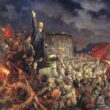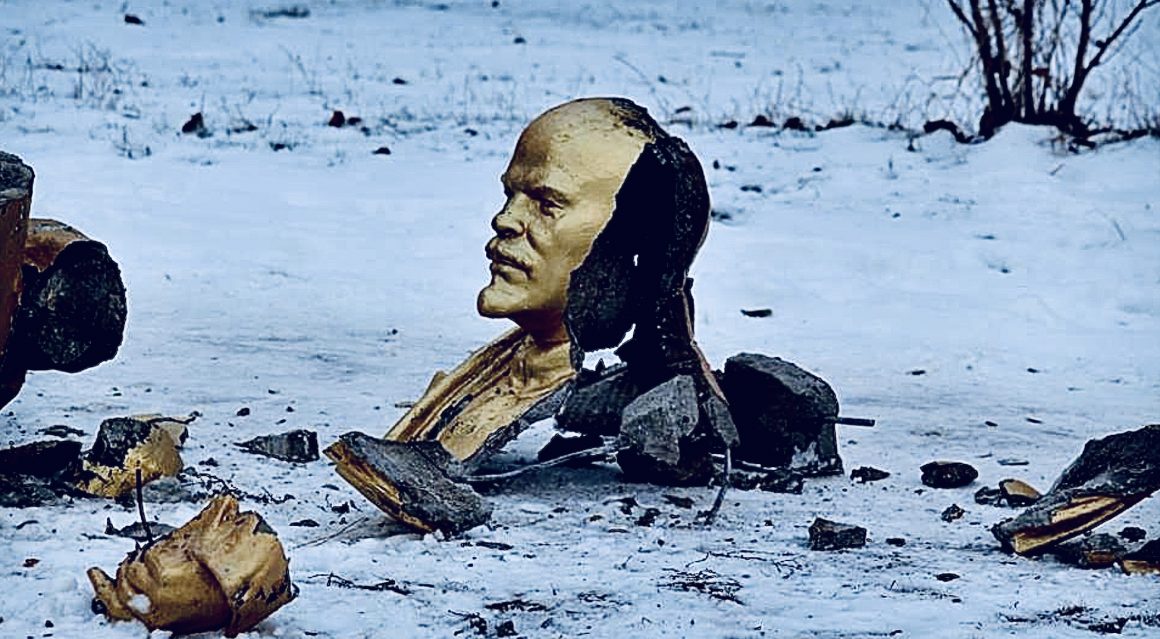The liberal view of world affairs is beset with an incurable contradiction: that liberalism claims to represent the freest possible social order, yet in practice it consistently leads to scenarios that are objectively unfree. This has been true since liberalism’s inception during the transition from feudalism to capitalism, in which the bourgeoisie set up a form of “democracy” that had to be compromised in order for capital to function. Under capitalism, democracy has always only truly existed for the elites, while everyone else is excluded from participating to varying degrees. When capital has found itself in crisis, the illusion of democracy has been abandoned, and undisguised bourgeois dictatorship has taken its place. This has happened most infamously in Indonesia, Chile, Brazil, and the other places where the CIA installed military dictatorships throughout the 21st century.
These incidents where capital has decided to take away the veneer of democracy were brought about in response to how during that time, it appeared the bourgeoisie’s range of influence was shrinking at a rate which would soon bring capital’s extinction. As of the middle of the 20th century, most of Eurasia had undergone proletarian revolutions during the last four decades alone. By the end of the century, revolutions had happened in many other countries, partially vindicating the theory that communism would bring down the world’s bourgeois states like falling dominos.
What let capital survive beyond the 20th century, and regain much of its former strength for a time, was the defeat of the USSR. This couldn’t have happened without that project to bring naked dictatorship to many of the exploited countries. It was because of the flip within the geopolitical balance, started off by the military coups of the 60s, that Washington could weaken the Soviets enough for capitalist restoration to be achieved. Indonesia was where the CIA first successfully tested its model for obliterating democracy, and the model was then replicated in all the places imperialism considered too significant to let fall into the Soviet sphere. The triumph of capital in the 20th century came from both the weakening of proletariat dictatorship within the USSR due to the Soviet Union’s internal revisionism, and the strengthening of bourgeois dictatorship within the Cold War’s most strategically important countries. This process of destroying civic freedoms was then expanded to the former Soviet bloc itself, where Washington used a formula of systematically shocking the citizenry to impose a new order.
This by all honest metrics represented a loss for the people. Living standards plummeted as corporations looted the public sphere with impunity, and political power was consolidated to prevent the popular will from interfering with business. This reality that Washington’s victory over the Soviets was not in fact a triumph for freedom, but a triumph for the dictatorship of capital, continues to pose an existential threat towards liberalism. A fundamental flaw in liberalism’s argument for existing remains unaccounted for, and this has the potential to bring fatal consequences upon the ruling class. The essential narrative that liberalism put forth after the USSR’s collapse was one in which bourgeois rule had been vindicated as history’s optimal governing model. It was argued that the end of history had been reached, meaning that even though world events would remain in flux, it was inevitable that liberalism would prevail. Yet liberalism had shown itself to depend on the destruction of freedoms, whether economic, social, or civil.
Any material benefits or “freedoms” that a population enjoyed under capitalism had been proven to not rest on stable ground, because as soon as capital encountered a crisis, the more well-off populations would be forced into the same conditions as those at the bottom of imperialism’s global hierarchy. Moreover, the poverty and unfreedom of those at the bottom would never disappear as long as capitalism remained. Liberalism lacks the ability to develop the neo-colonies towards humane living standards, just as it lacks the ability to eliminate poverty even in the imperialist countries. The system relies on the disenfranchisement of certain facets of humanity, and this ever-present nature of subjugation under capitalism is what makes communism a “specter” which can’t stop haunting the capitalist world.
To reconcile liberalism’s self-concept of safeguarding “freedom” with the reality of liberalism’s fundamental opposition to true global freedom, the liberal thinkers have redefined what “liberty” means. These intellectuals and commentators, as well as the ruling class they represent by extension, have concluded that it’s possible for there to be a liberal dictatorship. So long as the dictatorial or otherwise despotic regime is advancing the interests of capital, whether through opening their economies up to imperialist exploitation or through waging proxy wars against imperialism’s challengers, the regime is considered to be on the side of “freedom.”
This is how liberals can rationalize supporting Ukraine, a regime that’s banned all of its opposition parties, consolidated its media into one state-run broadcasting center, utilized fascist militias to exact ethnic cleansing and anti-communist violence, persecuted journalists, burnt protesters alive, placed weapons systems in urban areas to the consequence of needlessly endangering civilians, banned speech pointing out Banderism’s role within the Holocaust, brutally purged those labeled to be “traitors,” suppressed the speaking of Russian within public life to the effect of encouraging anti-Russian hate crimes, and sought to deny the eastern Russian speakers their right to separate from a fascist regime which seeks their removal. All of these contradictions can be justified in the liberal mind.
Like post-Soviet Ukraine’s initial contradictions of destructive privatization and corruption could be explained as the costs of defeating “autocracy,” these new injustices can be negated via the same narrative framework. That Ukraine fits liberalism’s own definition of an “autocracy,” as well as international law’s definition of a human rights abuser and war crimes perpetrator, doesn’t matter. Ukraine is still seen as on the “democratic” side, simply due to its acting as a tool for imperialism to counter Russia.
—————————
As great-power competition has become more significant than ever in terms of the risk for nuclear confrontation, and as capitalism has produced unprecedented new crises, the transition towards undisguised bourgeois dictatorship is again emerging as a global trend. The only bourgeois states that aren’t intensifying their wars against communism are the ones which exist increasingly at the mercy of their workers movements, such as Russia and Belarus. And even in Russia, austerity continues to intensify, since its communist movement mainly has leverage over the bourgeois state’s military decisions. Otherwise, the capitalist states are facilitating a disappearance of open society in order to suppress proletarian power. Indonesia has solidified its anti-communist speech restriction laws, criminalizing any statements judged to be promoting communism. This has gone along with a criminalization of abortion and premarital sex, paralleling the crackdown against social freedoms that the USA’s own fascist movement is carrying forth. It logically follows that Marxism will eventually be illegalized in the imperial center as well, forcing its workers movement to either go underground or go on the offensive.
The effects of the Ukraine conflict on civic liberties are making it clear that such a scenario is possible in the countries which supposedly have the most “freedom.” Under Latvia’s fascist government, it’s now illegal to voice support for Russia, an offense which conceivably extends to any statements that point out the contradictions within NATO’s Ukraine aid project. It’s only a temporary situation that the formal criminalization of speech challenging imperialism is isolated to the easternmost parts of Europe. As well as that the official illegalization of Marxism is isolated to the most historically repressive neo-colonial states. Ukraine and Latvia’s practices are fated to be incrementally exported, while their governments grow even more repressive and therefore set still more extreme precedents for the imperial sphere’s other countries. Kiev is showing how far the paradigm of unfreedom will ultimately go by building a police state inspired by Israel’s occupation of Palestine, in which Ukraine’s notoriously abusive national guard gets incorporated into daily life.
Because the imperial center has long been embroiled in its particular set of crises, it’s already not far from fully replicating Ukraine’s repressive state. The militarization of its police has been accelerating, and in certain cities, private military contractors have been emerging to commit abuses that even the police can’t so easily get away with. The southern border’s militarization, the construction of the globe’s greatest surveillance state, the continuation of the Guantanamo military prison, and the perpetuation of mass incarceration have made for a fortress America. The equivalent advancements in necro-politics are happening across the rest of the capitalist world. The further along this process becomes, the greater the discrepancy gets between what liberalism presents itself as and what it actually is. Therefore the greater the potential gets for expansion of revolutionary consciousness, and in turn revolutionary mobilization.
To maintain the system, this dilemma must be dealt with. A counterrevolutionary belief model has to be set in place, one that preemptively defends the people’s minds from ideas which threaten the power structure. If this can be accomplished with enough success, liberalism’s growing contradictions can be neutralized as a source for proliferating these ideas. Then the amount of society with the potential to gain revolutionary knowledge can be limited, so much that a serious obstacle to revolution gets created. This has already been accomplished, via the establishment of anti-communist orthodoxy.
Anti-communist orthodoxy was formed in accordance with the response that the workers movement made towards the formation of monopoly capitalism in the early 20th century. Faced with an unprecedented consolidation of capitalist power, to the effect that imperialism became converted to the export of capital into the peripheries rather than the export of goods, the workers created Leninism. Leninism’s goal was and is to build proletarian democracy, which gets protected by a state apparatus that will come to fade away after the threats to the workers’ gains get defeated. Its use of a state is the logical response to our conditions in the age of imperialism, where the bourgeoisie can easily overpower a workers movement unless that movement is protected by a state apparatus.
In the Democratic People’s Republic of Korea, the Leninist state that’s furthest developed towards communism, the end goal of a progressively withering state has been getting realized for decades. Because Korean socialism is so well protected by its military-first and self-reliance policies, it’s been able to afford to incrementally decentralize its state authority. It’s done this first by abolishing the presidential-level office that Kim Il Sung held, then expanding the opportunities to participate in governance among increasingly broad parts of the population. Should international politics continue to grow more favorable for the globe’s revolutionary forces, this transition to statelessness within Korea will continue, and the other socialist republics will start to catch up to Korea.
The essence of anti-communism is that it flips reality on its head. It does things like portray the DPRK as the globe’s most thoroughly constricting state, rather than the unparalleled advancement away from the state model which it is in reality. Along with this characterization of an extreme dictatorship comes a narrative that its leaders are dangerous to the rest of the globe, a narrative which has great sway. In most of the imperialist countries, and even some of the peripheral countries, the majority of society has accepted Washington’s psyop that the DPRK poses a danger of launching nuclear missiles without provocation. The deeper idea that the DPRK is not actually a democracy, but a monarchy that holds “totalitarian” power over its people, is believed by an even broader amount than are the specific pieces of anti-DPRK war propaganda.
The most crucial notion for liberalism’s narrative managers to instill is that the targeted country is deserving of nothing else than contempt and fear. This is why when imperialist propaganda targets a bourgeois state, like Russia or Iran, it’s still utilizing the core ideas behind anti-Leninism. The characterization of the USSR as an oppressive regime makes up the model for all modern imperialist propaganda, as the USSR was the first state to challenge imperialism in its modern form. Russia and Iran are naturally attributed the traits that make up the standard anti-communist caricature of a country, such as when they’re referred to as “Stalinist.” And “anti-Stalinism” is always a euphemism for anti-Leninism.
Preferably, those who have these perceptions about Washington’s geopolitical challengers don’t even think about how the given demonized country is in conflict with Washington, as knowledge of a war being present can lead to critical thoughts about the media’s depictions of the enemy. This is why the anti-Russian psyops have been receiving far more public skepticism than the psyops against north Korea, or China, or the other places that Washington is less directly in conflict with. These countries aren’t meant to be seen as opponents in a war, which is why U.S. leaders have been repudiating the idea that Washington is currently in a cold war with China. Countries like China are meant to be viewed as “bad actors,” as international villains that carry out their supposed transgressions with no provocation. If Washington’s conflicts with them were made more noticeable, more would be inclined to question the motives behind the U.S. media’s regular claims about them committing human rights abuses. More would have the impulse to ask, for instance: “but what’s the context behind why China is concerned about Taiwan?”
The more direct an imperialist war against a country becomes, like in the cases of Russia, Syria, or Iraq, the more substantial the effort becomes to investigate imperialism’s accusations against the target. There’s a risk behind making it unambiguous that we’re at war with a country, which is that it begs the question: “should we be at war?” Whereas an anti-fascist war like Russia’s can hold up to such scrutiny when this scrutiny is based in a factual analysis, an imperialist war cannot. When it is recognized that the empire is at war with a country, it’s desirable for only a select minority of society, concentrated within the intellectual class which most intensely consumes imperialist propaganda, to think of the conflict in such explicit terms.
Those among this 10% or so of the population are the ones most materially invested in the continuation of imperialism, and therefore have the least incentive to question the narratives their high-end media sources present them with. They’re naturally the ones who are the most passionate about seeing Washington’s geopolitical maneuvers succeed, and the most concerned with enforcing orthodoxy upon anyone who opposes the State Department’s accounts of history or current events. If robust discussion on global conflict or history were to spread into the working class, imperialism’s psyops would lose their dominance. It’s desirable for the average person to be not intellectually engaged with politics on a deep level, but only ever exposed to base slogans that are designed to manipulate their emotions.
Therefore should Washington succeed at provoking China into intervening in Taiwan, and start a proxy war in Asia parallel to the one in Europe, the imperialists will need to more aggressively counter pushback against their anti-Chinese propaganda. It’s another dilemma that the liberals create for themselves, again born out of the liberal international order’s need to take aggressive steps in order to survive. Whether these steps are to wage war against democracy, or to wage actual wars against countries, they produce narrative blowback. Especially in the online age of easily accessible anti-imperialist journalism.
—————————
To keep narrative control, liberalism must train the people to reject a certain idea. This idea is that a viable and desirable alternative to the current social order exists. As long as they don’t come to this conclusion, they can be as dissatisfied with their own conditions as they like without threatening the power structure, because their rejection of hope for a better future keeps them demobilized. The byproduct of this lack of hope is that their material dissatisfaction can be diverted towards faux-solutions, or made to dissipate into a sense of numb acceptance. Without the knowledge that a system superior to liberalism exists, they have nothing to compare their conditions to, and can decide that the existing order is the best conceivable one. Or they can embrace ideas about what “revolution” means that aren’t conducive to what’s created actual revolutionary projects like the PRC and the DPRK, since they’ve been conditioned to not recognize these projects as truly socialist. Just as desirable is when they recognize the socialist character of these countries, while seeing socialism as itself a bad thing. Whether anti-communism is leftist or rightist in its character, it functions to frustrate class struggle.
Behind every psyop that demobilizes the people, or mobilizes them in a way which harms the class struggle, is the idea that the lessons from Leninism should be disregarded. This applies to every intellectual caliber of counterrevolutionary propaganda, including the ones where those who’ve already developed class consciousness are led away from genuine Marxism. When psyops are directed at these types of individuals, their purpose is to prevent the emergence of a vanguard, of a group that’s been trained in the knowledge on how to defeat capital. This is done by providing the targets with ideological training which isn’t based in Marxist analysis, but rather perspectives that are compatible with imperialism while claiming to be “socialist.”
The idea that gangs and the lumpenproletariat should be fetishized by revolutionaries depends on ignoring socialist experiments like China’s, where the lumpen became “proletarianized” via job availability and criminal entities are now suppressed. The idea that the Ukraine conflict is an inter-imperialist war depends on ignoring the DPRK foreign ministry’s analysis on the war, which recognizes how Russia’s actions are about neutralizing a threat posed by the globe’s sole imperialist bloc (the U.S. bloc). Anarchism, as a whole, depends on the embrace of reactionary propaganda against existing socialism, as without this propaganda there would be no sufficient rationale for discounting existing socialism’s achievements. At its most base, anti-Leninism is about erasing the realities that socialist development has revealed. Whenever a former Soviet state tears down a Soviet statue, the objective is to negate the historical memory that the monument represents, as this memory threatens capital’s future.
It’s crucial for capital to erase not just the knowledge of the past, but the knowledge of what the future could bring under socialism, both across the former Soviet Union and the rest of the world. The picture of current events that the media depicts is one where the rise of China represents no kind of hope for advancing socialism, as in this version of reality, China is an imperialist power. The Belt and Road Initiative’s assistance in lifting the exploited countries out of poverty is portrayed as a neo-colonial project, which ironically is a narrative that Washington uses to justify AFRICOM. The DPRK’s guiding ideology of Juche is presented as a deviation from Marxism, a notion that starts to be established in the western mind through all of the claims about north Korea being anti-democratic. If one of these minds comes to Marxism, they can still be convinced that Juche is anti-Marxist. They only need to be persuaded to incorporate their previously internalized ideas about the DPRK into their new ideology. The same process can be used to steer them away from studying the theory behind Socialism with Chinese Characteristics.
As long as one is operating within the thinking framework imperialism has made hegemonic, they can’t advance socialism, even if they’ve read plenty of Marxist theory. This is because they’ve been conditioned to reject the theory put forth by Kim Il Sung, Xi Jinping, and other defining contributors to revolutionary thought. If the anti-communist conditioning in their mind is successful enough, they can be persuaded to not bother reading Stalin either. Even better, they can be convinced that Leninism itself was a “right-wing deviation” of Marxism, or better yet that Marx and Engels represented an “authoritarian” distortion of the true socialist theory. The ways in which revolutionary knowledge can be made to appear illegitimate are endless, and the forces of reactionary intrigue exploit this to manufacture constant infighting among those who consider themselves socialists. The key is to cultivate a myriad of sects that to varying degrees reject a dialectical analysis, and that aggressively attack those with the Marxist analysis from their respective rhetorical angles.
Now that the globe has transitioned to multipolarity, rejection of the theory guiding socialist China has become central to this left strain of anti-communism, in tandem with how anti-Chinese sentiment has become central to U.S. foreign policy thinking. Never can the PRC’s achievements be recognized as socialist by the anti-communist left, if they’re recognized at all. This has applied during the CPC’s recent period of de-liberalization, where the market reforms from the Deng era have been getting reversed now that they’ve fulfilled their purpose of building up the country’s economy. Like how the DPRK is portrayed as the most repressive state, despite its demonstrably fulfilling the promise that the state will wither away, the PRC is portrayed as a capitalist state, despite its now fulfilling the promise that its bourgeoisie will be suppressed after the productive forces get strengthened. When socialism does what it said it will do, this example of follow-through can’t be seen as real. The image of a fraudulent, untrustworthy socialism must be maintained.
In the age of Operation Z, where class conflict is accelerating to the effect that a Soviet restoration gets increasingly likely, this systematic delegitimization of existing socialism is being preemptively applied to the next socialist states that might emerge. This is being done through the cultivation of excessive pessimism about the class conflict in Russia and Belarus, which are the post-Soviet countries where Bolshevism could next triumph. Even though the governments of these countries are militarily acting according to the wishes of their respective communist movements, carrying out a joint anti-fascist intervention that the post-Soviet communists broadly recognize to be necessary, western leftism’s perception of these countries is that they’re hopelessly far from victory for socialism.
This perception is tied in with the idea that Operation Z is an imperialist action, or at least an action undertaken without anti-fascism as one of its guiding objectives. Should Russia and Belarus become socialist republics again, the western left will decry them as fraudulently socialist, perpetuating the idea that the globe isn’t actually seeing any revolutionary progress. History’s progress can’t be perceived, every victory for the revolutionary forces has to be seen as another victory for reaction. An inverted account of events is constantly updated to accommodate imperialism’s psyops.
The central narrative behind anti-Leninism, in which existing socialist experiments get painted as autocracies that use socialism as a guise for tyranny, has been around for a century. What’s made it more powerful than ever in the modern age is that now, all the psyops supporting the narrative can be imposed upon the people with unprecedented levels of saturation. Conversely, information that disproves the psyops can be suppressed with unprecedented efficiency. Algorithms are the key to both of these types of mass cognitive warfare, and NATO’s neuroscientists work to make them more sophisticated with each year. There are ways the internet has made traditional forms of censorship no longer as effective, like how Ukrainians can still access Marxist theory online despite this theory being illegal for them to possess in print form. But the censors aren’t above criminalizing the act of digitally opening up forbidden material, and this policy only becomes more prevalent as class conflict intensifies.
Moreover, imperialism’s psyops are absolutely capable of preventing one from interpreting theory in a way that leads to actual revolutionary action. The CIA’s campaign to incorporate communist rhetoric and iconography into Chinese protests shows how class consciousness can be distorted in this way. If the imperialists can’t use this psychological tactic to get China’s workers to overthrow their government, they’ll try to use it to stop the workers under imperial control from reaching a truly revolutionary analysis.
This dynamic where Washington’s warfare tools fail abroad, and then get imported to the places where imperialism holds grip, is getting more common as the U.S. empire turns inwards. The decline of American hegemony has mandated our ruling class to redirect its operations to the areas where they still have the ability to succeed, with the goal of achieving a new stasis for the global power structure. If they can’t stop their range of control from being shrunken, their system can only survive through the construction of a smaller version of the mid-20th century neo-colonial order. Therefore the proletariat in the imperialist countries themselves are being increasingly reduced in their economic status. This is even truer for the workers within the eastern European countries who live under U.S. client states.
This has produced the latest contradiction of liberalism, which is the irreconcilable conflict between liberalism’s goal of achieving stability, and the inherently unstable nature of capitalism. Capital needs perpetual expansion into new markets in order to survive, or its internal crises will bring down the system. The less able to displace its crises that capital in the core becomes, the more it has to sacrifice the material wellbeing of the core’s population. Which means destroying the social base of prosperous labor aristocrats that imperialism depends on to avoid revolution in the core. Less and less Americans, Europeans, or inhabitants of the eastern hemisphere’s imperialist benefactor countries have maintaining neo-colonial extraction as their primary material incentive. Their interests increasingly lie in proletarian revolution.
Our current reality is one where the ruling class can use war, and the propaganda this war involves, to maintain the present system’s material and social requirements. Washington can start wars in places like eastern Europe, Africa, or southwest Asia, letting the oil and arms industries profit from those wars while the people are diverted away from revolutionary thought by the conflict’s xenophobia and jingoism. Yet this doesn’t mean the reality we now know is a permanent fixture. By the nature of the system, austerity will continue to grow more severe. Which will continue to increase the amount of society that starts searching for a route out of the current socioeconomic system. However powerful the tools for preventing the spread of revolutionary knowledge become, they’ll always have limits. And the communist parties will always be capable of exploiting these limits, to the effect of bringing about a revolutionary scenario.
—————————————————————————
If you appreciate my work, I hope you become a one-time or regular donor to my Patreon account. Like most of us, I’m feeling the economic pinch during late-stage capitalism, and I need money to keep fighting for a new system that works for all of us. Go to my Patreon here.








